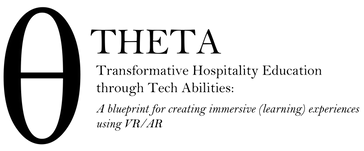This study investigates the usability of extended reality (XR) prototypes in the field of tourism education, focusing on the evaluation through the System Usability Scale (SUS). Framed within the THETA project, a collaboration between the Technological University Dublin, the University of the Balearic Islands, Hotelschool The Hague and Haaga-Helia University of Applied Sciences, the study focuses on four XR prototypes designed to enrich tourism teaching. The prototypes, developed to provide immersive and realistic educational experiences, were evaluated by students from the University of the Balearic Islands using the SUS. The objective was to determine the usability of these prototypes in a real educational context. The results obtained from the SUS indicated high usability, suggesting that the prototypes are suitable for use in tourism educational environments. This finding supports the effectiveness of XR as a pedagogical tool in tourism education and highlights the usefulness of SUS as a reliable method to evaluate the usability of innovative educational technologies. The study contributes to the understanding of how XR technologies can be effectively integrated into the tourism curriculum, opening avenues for future research and practical applications in this field.
I. INTRODUCTION Tourism education faces unique challenges and opportunities in today’s era, marked by rapid and changing technological advances. The integration of extended reality (XR) technologies, including augmented reality (AR) and virtual reality (VR), has been identified as a promising avenue to improve teaching and learning in this field. These technologies offer immersive and practical experiences, crucial in tourism education, where understanding of space, environment and customer experience are fundamental. The THETA project (KA220-HED-8C845691), is a collaboration between Technological University Dublin, the University of the Balearic Islands, Hotelschool The Hague and Haaga-Helia University of Applied Sciences. The overall aim of THETA is to prepare students and professionals for a changing profession by offering a versatile, virtual context for real-life case studies, using AR/VR-enabled learning spaces[6]. This project seeks to develop and evaluate XR prototypes to enrich tourism training. The usability of these emerging technologies is a primary concern, especially in an educational environment where users vary in their technological familiarity and competence. In this context, the System Usability Scale (SUS), a quick and reliable evaluation tool to measure usability, becomes an invaluable instrument. The SUS provides a quantitative view of ease of use and user satisfaction, essential aspects for the effective adoption of any new technology [8]. This study focuses on the application of SUS to evaluate the usability of four XR prototypes developed within the framework of the THETA project. These prototypes were designed to simulate diverse and educationally rich tourism experiences, encompassing a range of scenarios and activities common in tourism. By evaluating the usability of these prototypes with students from the University of the Balearic Islands, the study seeks to answer a fundamental question: Are the prototypes created in the THETA project with XR technologies usable tools for teaching in tourism and hospitality? The answer to this question has significant implications not only for tourism education but also for the widespread use of XR in higher education. Therefore, this article not only presents the results of the usability evaluation but also discusses the broader implications of the adoption of XR in tourism education, offering perspectives for future research and educational practices. This work is organized as follows: the methodology in Section II. Then, in Section III, we describe the results obtained. In Section IV, we discuss the main findings of this study, finishing with the conclusions and future work in Section V.


